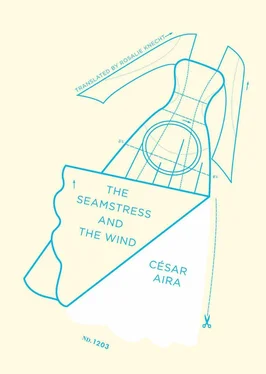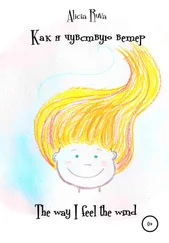The world, life, love, work: winds. Great crystalline trains that whistle through the sky. The world is wrapped in winds that come and go. . But it’s not so simple, so symmetrical. The actual winds, the air masses displaced between differences in pressure, always go toward the same place in the end, and they come together in the Argentinian skies; big winds and little winds, the cosmopolitan oceanic winds as much as the diminutive backyard breezes: a funnel of stars gathers them all together, adorned with their velocities and orientations like ribbons in their hair, and brings them to rest in that privileged region of the atmosphere called Patagonia. That’s why the clouds there are ephemera par excellence, as Leibniz said of objects (“objects are momentary minds”: a chair is exactly like a man who lives for a single instant). The Patagonian clouds welcome and accommodate all transformations within a single instant, every transformation without exception. That’s why the instant, which in any other place is as dry and fixed as a click , is fluid and mysterious in Patagonia, fantastic. Darwin called it: Evolution. Hudson: Attention.
I’m not talking in patriotic metaphors. This is real.
Traveling is real. Opening the door to all fears is real, even if what comes before and what comes after, the motives and the consequences, are not. To tell the truth I can’t figure out how it is that people can make the decision to travel. Maybe it would be helpful to study the work of those Japanese poets who trekked from landscape to landscape finding subjects for their somewhat incoherent compositions. Maybe the explanation lies there. “The next morning the sky was very clear, and just when the sun shone brightest, we rowed out into the bay.” (Bashō)
The skies of Patagonia are always clean. The winds meet there for a great carnival of invisible transformations. It’s as if to say that everything happens there, and the rest of the world dissolves in the distance, useless — China, Poland, Egypt. . Paris, the luminous miniature. Everything. All that remains is that radiant space, Argentina, beautiful as paradise.
How to travel? How to live in another place? Wouldn’t it be lunacy, self-annihilation? To not be Argentinian is to drop into nothingness, and no one likes that.
And in full transparency. . I want to make note of an idea, although it has nothing to do with all this, before I forget: might it be that the Chinese ideograms were originally conceived to be written on glass, so they could be read from the other side? Maybe that’s the source of the whole misunderstanding.
And in full transparency, I was saying. . a wedding dress. A cloud? No. A white dress, without the form of a dress, of course, or rather: without the form of a human, which it takes when placed on its owner or a mannequin, but instead its authentic form, the pure form of a dress, which no one ever has occasion to see, because it’s not simply a question of seeing it as a mountain of fabric thrown over a table or chair. That is formlessness. The form of a dress is a continuous transformation, limitless.
And it was the most beautiful and complicated wedding dress ever made, an unfolding of all the white folds, a soft model of a universe of whites. Flying at thirty thousand feet with what appeared to be majestic slowness, even though it must have been going very fast (there was no point of reference in the blue abyss of daylight), and changing shape ceaselessly, endlessly, giant swan, forever opening new wings, its tail forty-two feet long, hyperfoam, exquisite corpse, flag of my country.
SO MANY YEARS have passed that by now it must be Tuesday!
. . .
I’d left Delia wandering in the desolate twilight. After several hours of uncertain walking, she began to wonder where she would spend the night. She felt lost, suspended in an inhuman fatigue. A little more, very little, and she would be walking like an automaton, a lunatic. And now it didn’t really matter which way she went; if there was any apparition, anywhere, she’d go toward it. What alarmed her was the feeling that she was at the extreme end of caring: when she came out on the other side she would not change direction again. The night could, at a whim, become the kind of uniform desert that would invade her soul, and that possibility filled her with terror. A house, a roof, a cave, a cabin! An abandoned ranch, a shack, a shed! She knew that even from the depths of fatigue she could find the will to make any room habitable for a night, even the most deplorable. . She saw herself sweeping it, putting it in order, making the bed, washing the curtains. . They were absurd fantasies, but they consoled her a little even as her sense of abandonment grew, the plateau stretching out more and more and the horizon unfolding a new fringe of white, and another — did it make any sense to keep going?
It was practically nighttime. The only thing left was for darkness to fall. Each moment seemed like the last chance to glimpse a sign of salvation. And in one moment, finally, she saw something: two long, low parallelograms resting far in the distance, like two hyphens. She went toward them on winged feet, feeling all the pain of fatigue coiling in her veins. It was then that darkness fell (it must have been midnight) and the sky filled with stars.
She could no longer see her object, but still, she saw it. She hurried. She didn’t care if she was running toward her downfall. There were so many downfalls! She’d never been lost in the dark before, rushing toward the first shape she saw in the last light to beg for refuge and consolation. . but there’s a first time for everything. Nothing else mattered to her.
Delia was a young woman; she was barely past thirty. She was small, strong, well formed. It’s not a mere literary device to only say it now. For us children (I was her eleven-year-old son’s best friend), she was a señora, one of the mothers, an ugly and threatening old lady. . But there were other perspectives. It is the child’s point of view that makes women look ridiculous; more precisely, it makes them look like transvestites, and therefore somewhat comical, like social artifacts whose only purpose, once the child’s perspective is pushed aside a little, is to make us laugh. And even so, they are real women, sexual, desirable, beautiful. . Delia was one. Now, writing this, I ought to perform the readjustment, and it’s not easy. It’s as if my whole life were exhausted by the effort, and there remained no man with pen in hand, only a ghost. . Now as I say “Delia was one” I am falsifying things, making ghosts of them. No, Delia is not the luminous miniature in the reels of any movie projector. I said she was a real woman, and I submit myself to my words, to some of them at least. . to the words before they make sentences, when they are still purely present.
Suddenly she saw the enormous rectangles rise before her, like black walls that mercifully blocked her way. For most of the last three hundred feet she had believed that they were walls, but on arriving she saw her mistake: it was a truck, one of those gigantic tractor trailers, like the one that parked on her block, Chiquito’s truck. . She was so distraught it didn’t occur to her even for a moment that it might be the same one (as it actually was), which would have ended her search. .
Its lights were off, it was dark and silent, like a natural formation emerging from the plateau. Its thirty wheels, as tall as Delia, inflated with pounds of black pressure, rested on perfectly level earth. That’s what must have given it the appearance of a building.
The castaway marched toward the front of the truck, and on coming to the cabin she went carefully around, walking on tiptoe to see inside. The windshield, the size of a movie screen, covered the upper half of the truck’s flat front end. The constellations were reflected in the glass, and there was also a collection of butterflies smashed across it that the driver had not taken the trouble to clean off. The little pieces of wing, pale blue, orange, yellow, all with a metallic brilliance that intensified the light from the sky — were stuck there by their phosphorescent gel, tracing out capricious shapes in which Delia, even in her distraction, recognized lambs, tiny cars, trees, profiles, even butterflies.
Читать дальше












